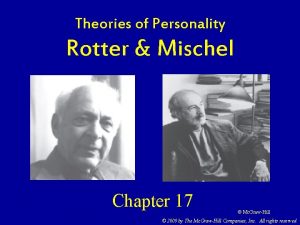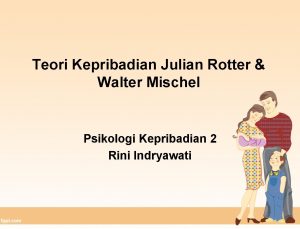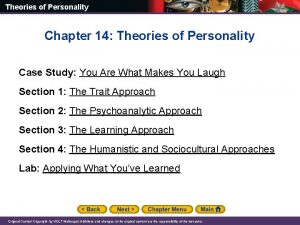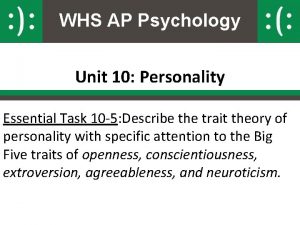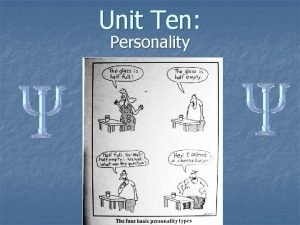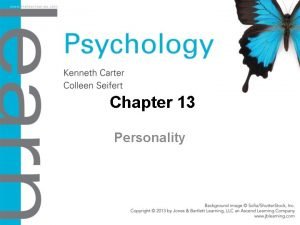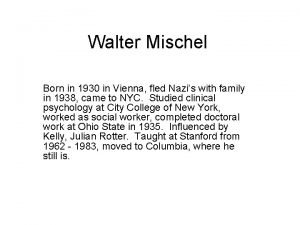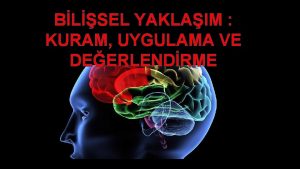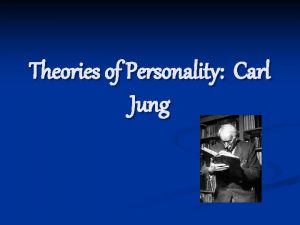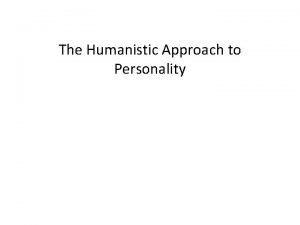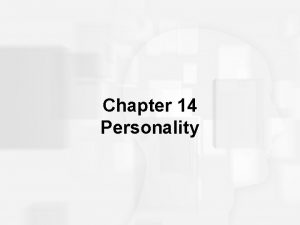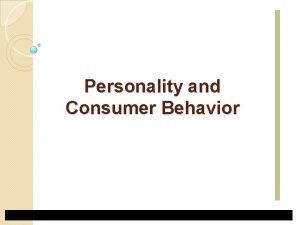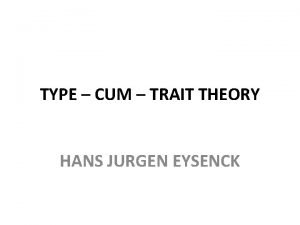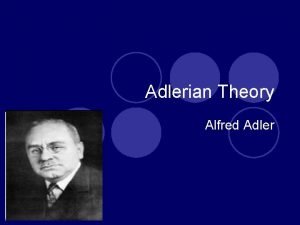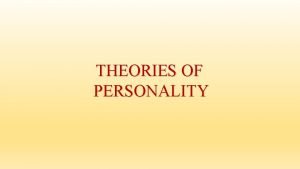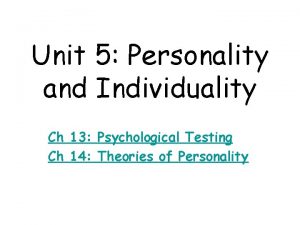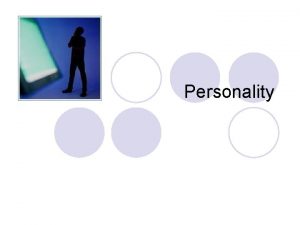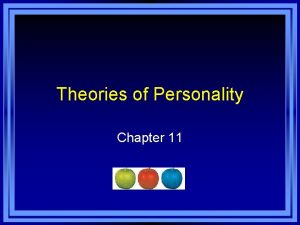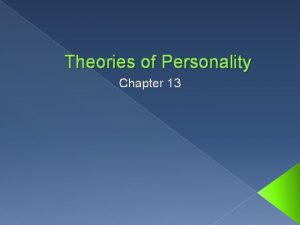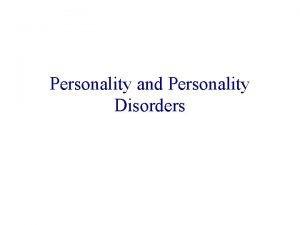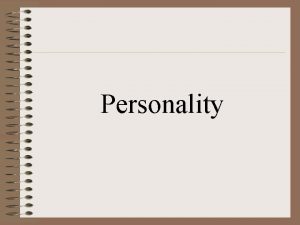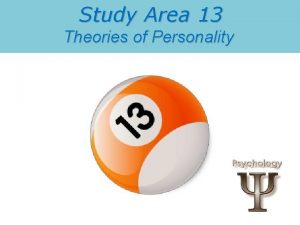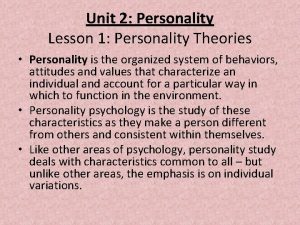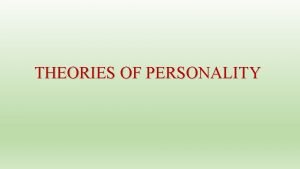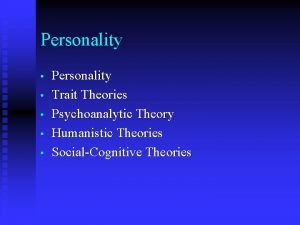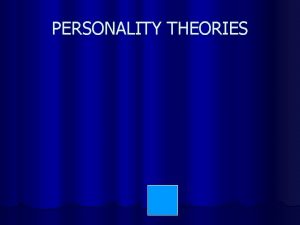Theories of Personality Rotter Mischel Chapter 17 Mc

















- Slides: 17

Theories of Personality Rotter & Mischel Chapter 17 © Mc. Graw-Hill © 2009 by The Mc. Graw-Hill Companies, Inc. All rights reserved

Outline • • Overview of Cognitive Social Learning Theory Biography of Julian Rotter Introduction to Rotter’s Social Learning Theory Predicting Specific Behaviors Predicting General Behaviors Maladaptive Behavior Psychotherapy Cont’d © Mc. Graw-Hill

Outline • Introduction to Mischel’s Personality System • Biography of Walter Mischel • Background of the Cognitive-Affective Personality System • Related Research • Critique of Cognitive Social Learning Theory • Concept of Humanity © Mc. Graw-Hill

Overview of Cognitive Social Learning Theory • Assumes Cognitive Factors Help Shape How People Will React to Environmental Forces • Expectations of Future Events are Prime Determinants of Performance • Focus on Interaction of People with Meaningful Environments • Examination of Consistency or Inconsistency of Personality © Mc. Graw-Hill

Biography of Rotter • Born in Brooklyn in 1916 • In high school, he became familiar with the writings of Freud and Adler • In 1941, received a Ph. D in clinical psychology from Indiana University • Published Social Learning and Clinical Psychology in 1954 • Moved to the University of Connecticut in 1963 and has remained there since his retirement © Mc. Graw-Hill

Introduction to Rotter’s Social Learning Theory • Rests on Five Hypotheses – Humans interact with their meaningful environments – Human personality is learned – Personality has a basic unity – Motivation is goal directed – People are capable of anticipating events © Mc. Graw-Hill

Predicting Specific Behaviors • Behavior Potential • Expectancy • Reinforcement Value – Internal and external reinforcement – Reinforcement-reinforcement sequences • Psychological Situation • Basic Predicting Formula © Mc. Graw-Hill

Predicting General Behaviors • Generalized Expectancies • Needs – Categories of needs • Recognition-Status • Dominance • Independence • Protection-Dependency • Love and Affection • Physical Comfort – Need components • Need Potential • Freedom of Movement • Need Value • General Prediction Formula • Internal and External Control of Reinforcement • Interpersonal Trust Scale © Mc. Graw-Hill

Maladaptive Behavior • Rotter defined maladaptive behavior as any persistent behavior that fails to move a person closer to a desired goal • Combination of high need value and low freedom of movement – That is, unrealistically high goals in combination with low ability to achieve them – Characterized by unrealistic goals, inappropriate behaviors, inadequate skills or unreasonably low expectancies of executing behavior © Mc. Graw-Hill

Psychotherapy • Bring Freedom of Movement and Need Value into Harmony • Changing Goals – The role of therapist • Help patients understand the faulty nature of their goals • Teach them ways to strive toward realistic goals • Eliminating Low Expectancies – The role of therapist • Teach effective problem solving • Help client to make distinction between past and present and teach assertiveness © Mc. Graw-Hill

Introduction to Mischel’s Personality Theory • Early Work Objected to Trait Theory Explanation of Behavior • Cognitive Activities and Specific Situations Play Role in Determining Behavior • Recently Have Advocated Reconciliation between Processing Dynamics and Personal Dispositions Approaches • Holds that Behavior Stems from Relatively Stable Personal Dispositions and Cognitive-Affective Processes Interacting with a Particular Situation © Mc. Graw-Hill

Biography of Mischel • Born in Vienna in 1930 • Second son of upper-middle-class parents • When the Nazis invaded Austria in 1938, his family left for the U. S. • Received his Ph. D from Ohio State University in 1956, where he worked under Rotter • Published Personality and Assessment in 1968 • Has taught at Colorado, Harvard, Stanford, and Columbia, where he remains as an active researcher © Mc. Graw-Hill

Background of the Cognitive. Affective Personality System • Consistency Paradox – Although both laypeople and professionals tend to believe that behavior is quite consistent, research suggests that it is not • Person-Situation Interaction – Mischel believes that behavior is best predicted from an understanding of the person, the situation, and the interaction between person and situation © Mc. Graw-Hill

Cognitive-Affective Personality System • Behavior Prediction – Individuals should behave differently as situations vary • Situation Variables – All those stimuli that people attend to in a given situation • Cognitive-Affective Units – – – Encoding strategies Competencies and self-regulatory strategies Expectancies and beliefs Goals and values Affective responses © Mc. Graw-Hill

Related Research • Locus of Control and Holocaust Heroes – Midlarsky et al. (2005) • Heroes had a higher internal locus of control • Person-Situation Interaction – Kammrath et al. (2005) • The average person understands that, depending on their personality, people adjust their behavior to match the situation – Mendoza-Denton et al. (2001) • Conditional and interactionist self-evaluations buffer negative reactions to failure • The social-cognitive interactionist conceptualization is more appropriate than traditional “decontextualized” views of personality © Mc. Graw-Hill

Critique of Social Learning Theory • High on Generating Research, Internal Consistency, Parsimony, and Ability to Organize Knowledge • Average on Its Ability to Guide Action and to Be Falsified © Mc. Graw-Hill

Concept of Humanity • • • Free Choice over Determinism Teleology over Causality Conscious over Unconscious Social Factors over Biology Uniqueness over Similarity Rotter's view is slightly more optimistic whereas Mischel's is about in the middle © Mc. Graw-Hill
 Rotter and mischel
Rotter and mischel Teori julian rotter
Teori julian rotter Rogers view of personality
Rogers view of personality Unit 10 personality ap psychology
Unit 10 personality ap psychology Behaviorist theory of personality
Behaviorist theory of personality Mischel's theory
Mischel's theory Mischel's theory
Mischel's theory Walter mischel biography
Walter mischel biography George kelly kuramı
George kelly kuramı Carl.jung theory
Carl.jung theory Http://www.outofservice.com/bigfive/
Http://www.outofservice.com/bigfive/ Freudian personality test
Freudian personality test Nature of personality
Nature of personality Trait theory eysenck
Trait theory eysenck Alfred adler teori
Alfred adler teori Theories of personality
Theories of personality Trait theories of personality _____.
Trait theories of personality _____. L
L
